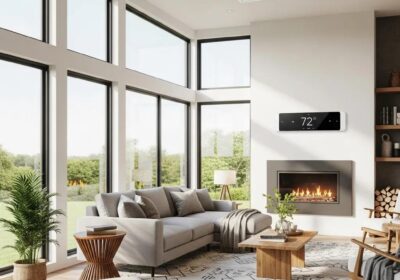Should You Add a Humidifier to Your HVAC System?
The comfort of your home often depends on the house’s humidity levels. If your house has insufficient humidity, the occupants may suffer from dry skin and cracked lips. On the other hand, high humidity levels can create a feeling of dampness and encourage mold growth.
So, should you add a humidifier to the HVAC system to control humidity levels? Read on to find out.
What Are the Types of Humidifiers?
Humidifiers connect to your HVAC unit to control the humidity levels in your home. The humidifier can store a specific amount of water, connect to a water supply, or create steam. The steam or water will then connect to the airflow from the HVAC unit. Most humidifiers connect to your duct system or furnace and can change the moisture levels throughout your home.
Steam Humidifiers
A steam humidifier uses your HVAC system to change water into steam. The steam enters the house through ductwork and spreads to all the rooms. The humidifiers usually have a reservoir to store the water. Hence, you may need a heat pump to get the water into the reservoir.
Heat pumps can be better than gas furnaces because the pumps generate heat at minimum pressure. Moreover, since the heat pump has its source of heat, the pump can produce greater amounts of moisture than a gas furnace. Therefore, the steam humidifier is more energy-efficient than other humidifiers. However, this humidifier has a high price tag.
Flow-Through Units
Fans are the distinguishing feature of the flow-through humidifier unit. The fans will blow the air flowing along the furnace’s air supply into the water panel. As a result, a flow-through humidifier can increase humidity levels in your home even if your furnace blower doesn’t work.
Bypass Humidifier
The bypass humidifier links to your HVACfurnace or air handler. Unlike the flow-through humidifier, the bypass humidifier lacks a motor and fan to push moisture. Instead, the humidifier relies on the fan in the furnace for warm air distribution. Regardless, the warm air will still pass through a water panel to absorb moisture.
The main benefit of a bypass humidifier is its relatively lower cost than other humidifiers. Moreover, the humidifier doesn’t need regular maintenance. However, a bypass humidifier can waste space because you have to connect the unit to the ductwork in your home. Also, these humidifiers lead to unnecessary waste of humidity and moisture due to the continuous loop mechanism.
What Are the Benefits of Adding a Humidifier to Your HVAC System?
A humidifier can increase the comfort and health benefits of your home. For example, a humidifier reduces the likelihood of irritation, asthma, and allergies by removing dry air from your house. If you have allergies, dermatitis, or eczema, a humidifier will help you by improving the air quality in your home.
If you don’t have allergies, a humidifier can still help moisturize your skin and sleep better. Your respiratory system will also be healthier, and cold symptoms will be less severe.
A humidifier also positively impacts your hardwood floors, windows, doors, and furniture. The humidifier removes dry air that can cause cracking and splitting of home fixtures.
You can get to enjoy these benefits if a professional HVAC company installs your humidifier. Fortunately, Baton Rouge Air Conditioning and Heating is here to help you with all your HVAC needs. We always strive to offer the highest quality services at the lowest rates possible. Contact us to know how we can help you.





Share This Article: Adding a Humidifier to Your HVAC System